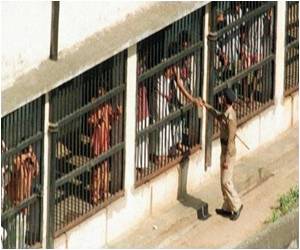Peter Pringle and Sunny Jacobs both escaped death row and are now an unlikely couple campaigning for an end to capital punishment.

‘At least 1,634 people were executed around the world in 2015, according to Amnesty International, the highest number since 1989.’





The chances of them ever meeting were small. Frail but alert, Sunny Jacobs spent five of her 68 years in a small cell in total isolation, waiting to have 2,400 volts sent through her body. "Peter and I, we don't often talk about it but sometimes things will remind us. That reminds me (of something) from inside, that reminds me (of something) from when we first got out," says Jacobs, ahead of the 6th World Congress Against the Death Penalty, being held in Oslo until Thursday.
"We very, very rarely mention the word prison. It's a visceral feeling you get when you say it." That's where she ended up after the murder of two police officers in 1976. According to her version of events, she and then-boyfriend Jesse were in a car belonging to a friend along with their nine-year-old son and 10-month-old daughter.
During a routine check, police found a weapon in the car and a deadly gunfight broke out. The friend, whom she says was holding a gun, later cut a deal, blaming the young couple. He received three life sentences, while Sunny and Jesse were sentenced to death.
"I was at the wrong place at the wrong time with the wrong people," she says. After five years, her death sentence was commuted to a life term, and she was finally released in 1992 having spent nearly 17 years behind bars.
Advertisement
- 'Like an animal' -
Advertisement
From his death row cell, he could hear the guards who monitored him around the clock talking about his upcoming execution, about the bonus they hoped to get, about the fact that they would have to pull on his legs to ensure his neck vertebrae were properly broken...
"If the jailers learned to like the condemned prisoner or respect the condemned prisoner, then it would be very difficult for him or her to engage in killing that person cold-bloodedly because you don't kill people you like," he suggests.
"So for their own protection, they would treat you like you were an animal, or less than human." Less than two weeks before his scheduled execution, he was informed that his sentenced had been commuted to 40 years in prison.
"It would have been political suicide to hang somebody in the country at that time," he says. He had already resigned himself to the idea of dying, but not to the idea of spending so many years in jail. He taught himself law and was exonerated after 15 years inside.
- 'It's about revenge' -
It was in a pub in Galway, Ireland, in 1998 that he met Jacobs, who was there to talk about the death penalty. They found they had a lot in common: their convictions, the happy endings, their interest in yoga and meditation that they had practised in prison, and more.
Married since 2011, they now run a help centre in Ireland for the victims of wrongful convictions. And they work tirelessly for the abolition of capital punishment. "If you teach children that if you make me angry enough, or you do something (that) I think is completely wrong, (and that) it's just fine for me to kill you, then when they get angry enough, they get a gun.
"And then you have Orlando, you have Sandy Hook," says Jacobs, referring to this month's massacre of 49 people at a gay nightclub, and another shooting at a Connecticut school in 2012 in which 26 people were killed. "The death sentence is not about deterrence," adds Pringle.
"It's about revenge. It's a situation where society cannot rise above the lowest level. Society has to be capable of rising above that." At least 1,634 people were executed around the world in 2015, according to Amnesty International, the highest number since 1989.
Source-AFP










